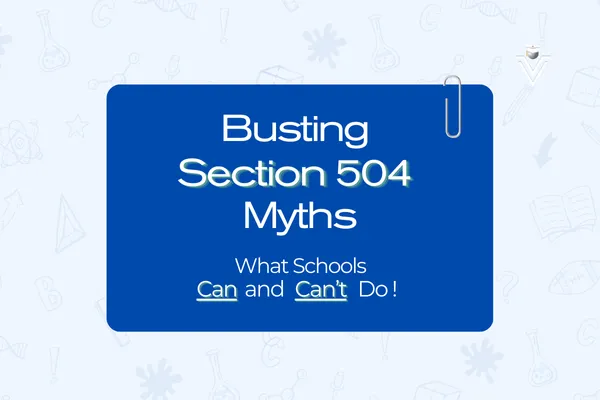
Busting Seven Section 504 Myths: What Schools Can and Can’t Do
As a parent, have you ever been told something about your child’s rights under Section 504 that didn’t seem right? You’re not alone! There’s a lot of misinformation and false information about what Section 504 is and isn’t. These myths can prevent students from getting the accommodations they need. Let’s separate fact from fiction so you can confidently advocate for your child’s education.
Myth #1: “Only special education students qualify for a 504 Plan.”
False! Section 504 is separate from special education services under IDEA. Your child does NOT need an IEP to qualify for a 504 Plan. If your child has a physical or mental impairment that substantially limits major life activities like learning, concentrating, or thinking, they may be eligible.
Myth #2: “A medical diagnosis automatically guarantees a 504 Plan.”
NO! A medical diagnosis is only one piece of information, and schools must consider information from a variety of sources.
Myth #3: “If my child has good grades, they don’t need a 504 Plan.”
Wrong! Just because a child earns good grades doesn’t mean they aren’t struggling or don’t have a physical or mental impairment that substantially limits a major life activity. Schools must consider more than grades and look at other pieces of information and factors such as focus, fatigue, anxiety, or physical challenges.
Myth #4: “Teachers can pick and choose which accommodations to follow or not follow the plan at all if they don’t want to.”
Nope! A 504 Plan is legally binding. Once in place, teachers and staff must implement the accommodations as written. Failure to do so could be considered discrimination.
Myth #5: “Parents don’t have a say in the 504 process.”
Absolutely not! You are your child’s biggest advocate! You have the right to request an evaluation, attend meetings, provide input, and challenge any decisions. Schools must collaborate with families. Your voice matters!
Myth #6: “Schools can deny a 504 Plan because they don’t have enough resources.”
No again! Lack of funding or staff does NOT exempt schools from following the law. Schools must provide reasonable accommodations, even if it requires training staff or adjusting how services are delivered.
Myth #7: “A 504 Plan automatically follows a student after high school.”
No. While K-12 public schools must follow Section 504, colleges and workplaces operate under the Americans with Disabilities Act (ADA). Your child will need to request accommodations and provide documentation, so teaching self-advocacy is key!
Understanding these myths and facts empowers you to stand up for your child’s rights. If you ever feel your child is being denied what they need, don’t be afraid to ask questions, push for answers, and seek experienced advocate support!
Ready to Empower Your Child?
Learn how Linda J. Silver, Education Consultant can help you support your child’s journey.
Read Linda's Bio to discover her expertise and unique approach.
Explore our services tailored to children with disabilities.
Check out our case studies for real-life success stories.
Schedule a FREE consultation today and take the first step towards unlocking your child’s potential!
